- Register
- Log in to Tune-In
- Wishlist (0)
-
Shopping cart
(0)
You have no items in your shopping cart.
Beatles News

Spoon-bending performer and self-proclaimed mystic Uri Geller has told the BBC he is the buyer of a pair of glasses given by John Lennon to a man from Surrey. The iconic blue-tinted round sold for £40,000 in an auction on Wednesday held at Farleigh Golf Club, in Surrey.
Mr Geller, who plans to display the glasses prominently in his museum in Tel Aviv, Israel, said he was "elated" with his purchase.
He said: "John Lennon and I were very good friends while we were living in New York in the 1970s." The glasses were given by the former Beatle to a man from Surrey as a birthday present more than 55 years ago.
Catherine Southon Auctions said the singer gifted them to their seller - identified only as Michael - at Abbey Road Studios in 1968.
On putting in the highest bid, Mr Geller said: "I knew I had to buy these glasses whatever. I would have gone up to £500,000.
"Glasses are a passage into our soul, into our psyche." He said he had a “really close” friendship with John Lennon, “because we had an amazing connection”. The showman, now in his 70s, added: "John changed my life as that's where I learned about spirituality.
"He believed in UFO details
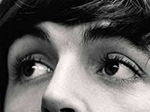
Sir Paul McCartney confirmed Thursday that he was hacked by the British press, but doesn't have details. He said police will brief him when he returns to London.
McCartney held a wide-ranging press conference via satellite from Cincinnati in conjunction with his upcoming Showtime doc, "The Love You Make," about the benefit concert he put on after 9/11. But McCartney didn't bat off questions about his storied career, talking about how "Yesterday" and "Let it Be" came to him in dreams, the fact that he's about to marry his second NYC woman, why he was wearing a collarless jacket and how he loves ESPN and shopping networks. "Where do you think I got this jacket?" he said.
He also said that he's doing more Beatles songs than ever. "I try to give the audiences what they want," he said. Too bad he couldn't give Minnesotans what we want: A McCartney concert at Target Field. A proposed concert there fell through earlier this summer.
You can get more of his quips and reflections at my twitter site: @nealjustin
The Showtime special airs Sept. 10.
Source: nealjustin/startribune.com
details

THE Beatles, who rose to prominence in the 1960s captured the entire world with their brand of music.
By far, The Beatles have influenced generations through their music and connected people from across the globe through their massive hits.
But were all four members of The Beatles able to read or write sheet music? Ever wondered if they weren’t able to do so?
Is this true?
THE Beatles, who rose to prominence in the 1960s captured the entire world with their brand of music.
By far, The Beatles have influenced generations through their music and connected people from across the globe through their massive hits.
But were all four members of The Beatles able to read or write sheet music? Ever wondered if they weren’t able to do so?
Is this true?
Verdict:
TRUE
The Beatles, who are John Lennon (the late), Paul McCartney, Ringo Starr, and George Harrison, could not read music.
In a 1980 interview with Playboy magazine, John Lennon was quoted saying: "None of us could read music, none of us could write it.
"But as pure musicians, as inspired humans to make the noise, they (Paul McCartney and Ringo Starr) are as good as anybody," details
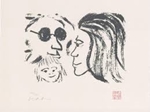
Houston has a wealth of arts organizations, offering performances of everything from avant garde theatre to classical music to multiple genres of dance. Even the most art-obsessed Houstonians may feel overwhelmed at deciding which performances to attend, especially if they're on a budget.
Thankfully, a popular program helps newbie arts lovers and longtime patrons alike. Houston Theater Week 2024 offers buy-one-get-one-free deals for more than 250 performing arts programs for the upcoming 2024-2025 arts season. Sponsored by the Houston First Corporation, the event, which runs from August 12 to 18, is a chance for Houstonians to explore performances by 22 professional performing arts organizations.
“Houston’s annual Theater Week is making a difference for both patrons and our arts organizations," Theater District Houtson's Hillary Hart said in a statement. "Not only does the revenue generated through ticket sales keep artists and other creative professionals working, it strengthens our already vibrant theater scene and exposes new audiences to a range of cultural performances by some of the best talent in the world at a discount."
Among the organizations participating this year are 4th Wall The details

"I didn't know what to do with myself, and trying something new was really risky," said the legendary singer. Paul McCartney is opening up about life after The Beatles.
The 80-year-old icon was a member of the 7-time Grammy-winning group with John Lennon, George Harrison and Ringo Starr until it disbanded in 1970. McCartney then ventured out into a successful solo career.
On his website, the "Coming Up" singer answered a question that a fan asked via Twitter on the biggest risk he's taken in his decades-long career.
"The main question I had was whether to keep going after The Beatles," he wrote in the post published on Tuesday, "because it was a hard act — some might say, an impossible act — to follow."
Praising the group's talent, McCartney added, "The ingredients in the Beatles were so unique. You had John right there, who could have made any group brilliant. Then you had George's talent, and Ringo's, and then me."
McCartney confessed that once the members went their separate ways, "I didn't know what to do with myself, and trying something new was really risky."
Source: Charmaine Patterson/ca.news.yahoo.com
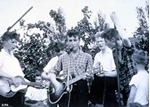
In the late 1950s, John Lennon formed a skiffle group called the Quarrymen, named after his school. The line-up featured John on guitar with Paul McCartney and George Harrison, John 'Duff' Lowe on piano, and Colin Hanton on drums.
After rehearsing at McCartney's house, they booked a recording session at Percy Phillips' studio at 38 Kensington, Liverpool, in July 1958 and recorded In Spite Of All The Danger, a song credited to McCartney and Harrison. They could afford only one copy of the 10in disc, so they agreed to share it, with each member keeping it for a week. Lowe ended up keeping it for 23 years.
When he rediscovered it in 1981, he contacted McCartney, who bought it from him for an undisclosed fee. It was eventually released on The Beatles Anthology 1 in 1995.
After several changes in their line-up, the Quarrymen evolved into The Beatles. Over recent years, McCartney has played In Spite Of All The Danger on concert dates, much to the delight of his fans.
Source: MSN
details
The Beatles have nothing left to prove as a musical entity. They have ranked as one of the most commercially successful and impactful names in the industry since they first broke out in the early ‘60s. Decades later–and long after they split–the band is still hitting new highs and improving their legacy.
This week, The Beatles’ 1 reaches a very special milestone. The compilation has now lived on the Billboard 200 for 550 weeks.
1 is The Beatles’ longest-charting title on the Billboard 200, Billboard’s weekly ranking of the most-consumed albums in the U.S. It’s their first release to make it to 550 frames on the tally, and it likely won’t be matched for some time.
The Beatles’ second-longest-running win on the Billboard 200 remains Abbey Road. That album is nearing 500 weeks on the list, as it’s already up to 491 stays on the roster. While it may be close to that sizable figure, Abbey Road doesn’t often appear on the Billboard 200–unlike 1.
The compilation rises just two spots this frame. Last week, it sat at No. 197; now it’s up to No. 195. The singles collection is barely hanging on, as the roster only features 200 spa details

Every day Curt Gunther, drawing deeply on a cigarette, his wise and cunning eyes boring into mine, would say: "Derek, we gotta have some special pictures, something original."' - Derek Taylor
Although Brian Epstein had decided that no journalists would travel with The Beatles on the tour, Derek Taylor, Press Officer and friend to The Beatles, persuaded Epstein to allow Curt Gunther to join the tour party. With unparalleled access, Gunther's lens reveals candid moments, electric performances, and the whirlwind of Beatlemania that swept across North America.
From the excitement of their arrival in San Francisco to the fervent crowds at their concerts across the United States and Canada, each photograph encapsulates the essence of a cultural phenomenon. Mania Days features over 350 images, many of which have never been seen before, showcasing The Beatles both on and off stage. Readers are treated to behind-the-scenes glimpses of John, Paul, George, and Ringo's camaraderie, their interactions with fans, and their responses to the burgeoning fame that defined an era.
Source: genesis-publications.com
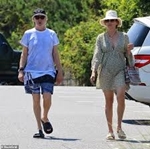
Sir Paul McCartney and his wife Nancy looked serene and care-free on Monday as they headed home from a day at the beach in the Hamptons.
The Beatles legend, 82, put on a casual display for their outing, sporting a plain T-shirt and swimming trunks with a boat pattern.
But Paul showed he's kept up to date with fashion, as he added a pair of black sliders, resembling the trendy Yeezy style shoes.
The singer-songwriter also made sure to keep himself shielded from the sun with a baseball cap and dark shades.
Sir Paul McCartney and his wife Nancy looked serene and care-free on Monday as they headed home from a day at the beach in the Hamptons. The Beatles legend, 82, put on a casual display for their outing, sporting a plain T-shirt and swimming trunks with a boat pattern
But Paul showed he's kept up to date with fashion, as he added a pair of black sliders, resembling the trendy Yeezy style shoes. Showing off her impeccable sense of style, she teamed it with a pair of woven sliders and a cream bucket hat. The mother-of-one added a couple of layered necklaces and a pair of oversized sunglasses, while toting a small striped bag.
The couple have been married for almost 13 years, h details
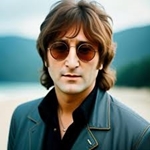
John Lennon, born on October 9, 1940, in Liverpool, England, was a legendary singer, songwriter, and peace activist who co-founded the iconic rock band, The Beatles. He was a pivotal figure in the music industry and became one of the most influential and celebrated musicians of the 20th century.
In the early 1960s, along with Paul McCartney, George Harrison, and Ringo Starr, John Lennon formed The Beatles, a band that would revolutionize popular music and become a cultural phenomenon. As the primary songwriter and co-lead vocalist of the group, Lennon’s creative contributions were instrumental in shaping their sound and style.
The Beatles’ massive success and unprecedented fame brought Beatlemania to the world, influencing an entire generation and changing the landscape of popular music forever. Some of Lennon’s most iconic compositions for The Beatles include “Imagine,” “Strawberry Fields Forever,” “A Day in the Life,” and “Let It Be.”
In 1969, John Lennon married artist and musician Yoko Ono, and the couple became known for their activism and advocacy for peace. Their “Bed-In” events, peace protests, and iconic song “Gi details
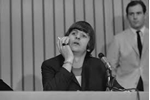
Ringo Starr never turned to The Beatles' assistant with his problems. Here's why the assistant wished Starr would have sometimes.
Due to the enormity of their success in The Beatles, John Lennon, Paul McCartney, George Harrison, and Ringo Starr had an entire staff of people to support them. One of these people was Alistair Taylor, who worked as the assistant to Beatles manager Brian Epstein. The band began to refer to Taylor as “Mr. Fixit” because of his skill at finding solutions to their problems. According to Taylor, Starr was the only one who never bothered him with his problems.
Taylor grew accustomed to dealing with The Beatles’ problems. McCartney, for example, asked Taylor to track down a waitress he met and invite her on vacation with him. Taylor did jobs like this for Lennon and Harrison as well, but he said Starr never asked him for help.
“[T]he one person that never, ever bothered me was Ritchie [Ringo],” Taylor said in the book All You Need Is Love: The Beatles in Their Own Words by Peter Brown and Steven Gaines. “He was always apologetic, and he never bothered me. I’d find he’d done something. And I used to say to him, ‘Look, why on eart details

The Polish state broadcaster on Saturday suspended a television journalist who, during the Olympic Games opening ceremony, reacted to a performance of John Lennon’s “Imagine” by saying it was a “vision of communism.”
TVP, the broadcaster, issued a statement Saturday saying that the journalist and sports commentator, Przemyslaw Babiarz, would not be allowed to comment on air anymore during this summer’s Games.
Lennon’s song asks to imagine no heaven or hell, no countries, and no possessions.
“This is a vision of communism, unfortunately,” Babiarz said during the grand opening ceremony along the Seine River in Paris on Friday evening — comments that immediately triggered controversy for those watching in Poland.
TVP said in its statement announcing his suspension: “Mutual understanding, tolerance, reconciliation — these are not only the basic ideas of the Olympics, they are also the foundation of the standards that guide the new Polish Television. There is no consent to violate them.”
State media has been an ideological battleground in Poland for years. It was used as a mouthpiece by the right-wing populists who g details
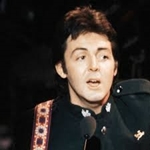
Ever wondered who your favorite guitarist’s favorite guitarist is? Many of the greats have been tight-lipped about their personal inspirations, while others have been pretty forthright about the musicians they love.
Kurt Cobain loved The Stooges, David Bowie loved Arcade Fire (not the other way around; though we imagine the feeling is mutual), and Chris Martin loves Radiohead. Not surprisingly, former Beatles multi-instrumentalist and songwriter Paul McCartney has expressed his love for his favorite guitarist, Jimi Hendrix.
Paul McCartney Has Said in the Past That His Favorite Guitarist Is Jimi Hendrix
Paul McCartney wasn’t solely a guitarist for The Beatles. He was more well-known as the band’s bassist, as well as (more or less) one-half of the songwriting talent behind the legendary rock band. Still, he knows his way around the guitar, among other instruments.
McCartney and Hendrix ran in similar circles during their heydays in the late 1960s. McCartney said that he saw Hendrix perform in London at the Saville Theatre shortly after The Beatles released Sgt. Pepper’s Lonely Hearts Club Band. Hendrix even covered that album’s title track once he heard that McCartney details
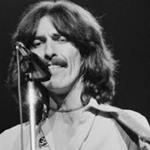
No musician is immune to the occasional beef with another musician. Though, we’d have to say George Harrison of The Beatles’s “beef” with the brothers behind Oasis was a little bit one-sided.
Many musicians out there have voiced their distaste for the Manchester, England rock band Oasis. Blur, Radiohead, Mick Jagger, and the actual members of Oasis are a few examples. And not surprisingly, George Harrison also had a few cross words for the band, as well.
In a way, it’s quite sad. Noel and Liam Gallagher have said that Oasis took a lot of inspiration from The Beatles. It was well-known that they were the Gallaghers’ favorite band. Never meet your heroes, kids.
“The music lacks depth,” Harrison said of Oasis’ music back in 1996. “And the singer Liam is a pain, the rest of the band don’t need him.”
It was a pretty shocking jab at the band, particularly Liam. And he didn’t take it sitting down. In an interview with MTV shortly after, Liam went as far as to threaten the former Beatle.“If any of them old farts have got a problem with me, then they should leave their Zimmer frames at home, and I’ll hold them up wit details

It was in August of 1964 when the British invasion first came to Colorado with the group that started it all…the Beatles. If you love the Beatles, you won’t want to miss the most unique, fun and affordable concert event of this summer at Red Rocks with The #1 Beatles Show in the World, “1964” The Tribute.
This group is hailed by critics and fans alike as the most authentic and enduring Beatles tribute in the world. Choosing songs from the pre-Sgt. Pepper era, “1964” recreates an early 60s live Beatles concert with period instruments, vintage costumes, hairstyles, onstage mannerisms, speaking voices, and unmistakable harmonies of the lads from Liverpool. Over forty years of researching and performing at major concert venues on four different continents has made the “1964” group masters of their craft in capturing the essence of the Beatles live on stage.
This 60th Anniversary celebrates Red Rocks Amphitheatre as one of four original concert sites still remaining from the Beatles first American tour in 1964. In celebration of this historic event, “1964” will include the 10 songs The Beatles performed at Red Rocks in 1964. Come experience the magic and se details
